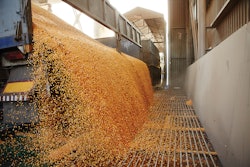
CHS Inc. released results for its third quarter ended May 31, 2023.
The company reported quarterly net income of $547.5 million compared to a record third quarter net income of $576.6 million in fiscal year 2022.
For the first nine months of fiscal year 2023, the company reported net income of $1.6 billion and revenues of $36.1 billion, compared to net income of $1.2 billion and revenues of $34.4 billion recorded during the same period of fiscal year 2022.
The company noted fiscal 2023 third quarter highlights:
- The energy segment delivered strong earnings, reflecting sustained favorable market conditions in refined fuels business.
- Improved soybean and canola crush margins due to strong meal and oil demand resulted in higher earnings in oilseed processing business.
- Market-driven price decreases for wholesale and retail agronomy products resulted in lower margins versus the same period last year.
"Consumer demand remains strong for energy and oilseed products, and our joint venture investments continue to contribute to strong earnings and round out our well-diversified portfolio," said Jay Debertin, president and CEO of CHS Inc.
"As we enter the end of our fiscal year, opportunities remain for profitability and growth in the agriculture industry, and CHS is well-positioned to maximize value for our member cooperatives, farmer-owners and customers."
Energy: Pretax earnings of $199 million for the third quarter of fiscal year 2023 represent a $35.8 million increase versus the prior year period and reflect:
- Strong refining margins attributed to global market conditions and favorable pricing of heavy Canadian crude oil in our refined fuels business
- Higher margins were partially offset by decreased refined fuels production volumes related to planned major maintenance at our refinery in Laurel, Mont.
Ag: Pretax earnings of $233.5 million represent a $40.2 million decrease in earnings versus the prior year period and reflect:
- Increased margins in grain and oilseed and processing product categories, due primarily to strong meal and oil demand
- Market-driven price decreases, particularly for wholesale and retail agronomy products, which led to lower margins















